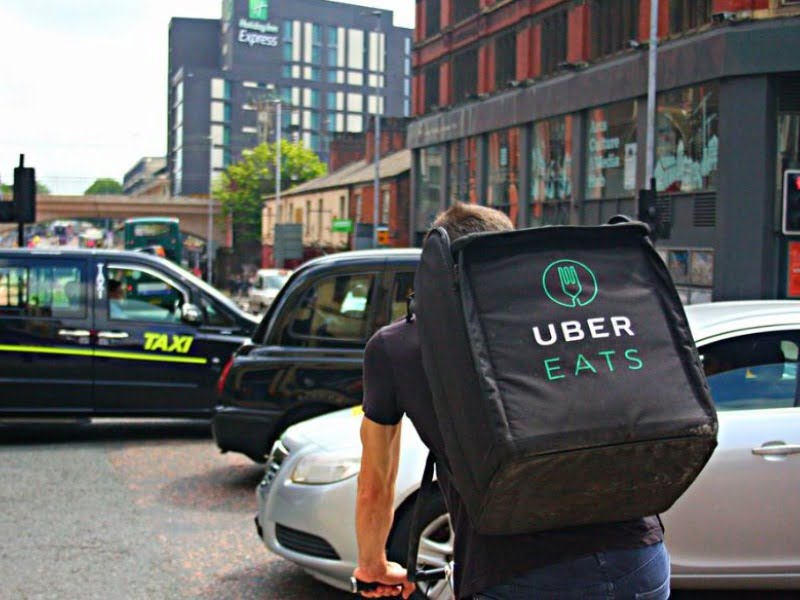Gig economy workers need more protections and dispute resolution methods, according to a long running review of the Australian sector, which has warned riders and drivers for companies like Uber and Deliveroo are underpaid and lack appropriate health and safety protections.
A Labor-led Senate Committee inquiry into job security on Thursday tabled its first interim report, examining on demand platform work in Australia. Among its 15 recommendations are a new federal regulator to monitor platform companies and law reform to recognise workers as employees.
The report notes that while the work can offer great flexibility to business and workers, it comes at a dangerous cost.
“Notwithstanding this [flexibility], the committee feels strongly that the current arrangements, conditions and pay rates for gig workers are not acceptable and do not provide them with sufficient income and other protections to provide for themselves and their families,” it said.

The report also found gig economy workers often work in high risk, unsafe work and face “unrealistic time and performance pressures”, but have little capacity make improvements.
The inquiry, which will table a final report in November, has now heard more than 120 submissions from stakeholders, including each of the main gig economy platform companies which insist workers are independent contractors rather than employees and are paid fairly.
Liberal and National party Senators involved in the inquiry dismissed the report findings as a biased “partisan stunt”, and supported only two of the 15 recommendations, both regarding the expansion of labour force data collection.
At inquiry hearings, Australian unions have warned gig economy workers suffer unsafe work conditions and are paid well below the minimum wage, while platform company Amazon has terminated workers for even speaking with unions. Amazon denied the allegation.
However, in interim findings, the inquiry found gig economy workers in Australia are not paid fairly, and recommended reforms for the sector and more independent data collection. The committee was also concerned that on-demand platform work “is disproportionately and negatively affecting vulnerable groups”, including Indigenous people, women, young people, older workers, people with a disability and migrant workers.
Platform companies told the inquiry the “independent contractors” they use to deliver food, parcels and people are paid slightly above minimum wage for flexible work.
Uber told the inquiry it collects up to 25 per cent of a fare, excluding the GST which the customer pays. Drivers are left with around $21 an hour after expenses, according to the ride sharing giant. However, the transport union says the effective wage for an Uber driver is less than $13 per hour when all costs are considered.
On demand food and parcel delivery workers earn similarly low wages, the union said, putting gig workers among the lowest paid people in Australia. The Australian national minimum wage for casual workers is $24.80.
The interim report called for workers in the gig economy to be paid a rate “that recognizes the value of the work they do” and that they should receive conditions that ensure they are not forced to work when sick or that their families are not left destitute when they are injured or killed, the inquiry’s committee found.
They should also be paid superannuation and have access to labour protections providing dispute resolution and mechanisms for addressing discrimination and harassment, according to the the report.
“The committee considers that fundamental changes to the structure of on-demand platform work are required to ensure that people are given some certainty in their work, that they are paid fairly, are able to work as safely as possible, and that they have protections for themselves and their families when they are ill, injured or if they are killed at work.”
The interim recommendations include expanding national labour surveys to capture on demand workers and their injuries, while guidelines for applying national work health and safety laws to gig economy jobs should be developed as “a matter of priority”, including where duty of care lies in platform work in the disability sector.
The report also recommended platform companies be required to pay workers’ compensation premiums for workers, and the Australian government should lead reform of state-based workers’ compensation schemes so that they extend to platform workers. An intergovernmental NDIS entitlement scheme should also be established to allow workers to provide portable long service leave, sick leave and other leave and training entitlements.
The federal government should also update the Fair Work Act to expand definitions of employment and employee to capture “new and evolving forms of work”.
The Fair Work Commission should also be granted broader powers to monitor and enforce workers’ rights, while a new federal regulator should be considered to gain more oversight of on-demand companies.
The recommendations also include a call for the separate inquiry into the NDIS consider the impact of platform work on the scheme, which should also get more regulations to support workers.
But the two government senators, Nationals Senator Matthew Canavan and Liberal Senator Ben Small, have dismissed all but the two data collection recommendation, and claimed the inquiry is a “partisan stunt”.
“Government Senators support workplace legislation and reform that promotes increased flexibility for all parties involved, driving better economic outcomes for both business and workers of all classifications,” they said in their dissenting report.
The committee is due to present its final report by 30 November 2021.
Do you know more? Contact James Riley via Email.

